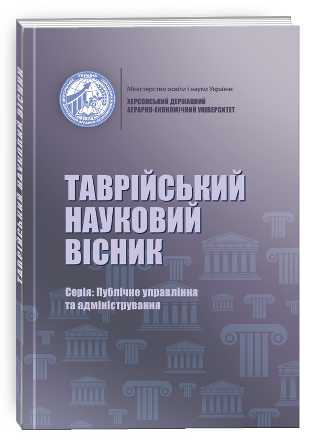ENHANCING FOREIGN LANGUAGE COMPETENCE AMONG FUTURE SPECIALISTS IN PUBLIC MANAGEMENT AND ADMINISTRATION
DOI:
https://doi.org/10.32782/tnv-pub.2023.3.1Keywords:
foreign language, foreign language competence, public administration and management, English for specific purposesAbstract
The article examines the problems associated with the foreign language competence development of future specialists in the field of public administration and management. A foreign language in higher education institutions is more than just a subject within the humanities field; it plays a crucial role in acquiring specialized knowledge and has become an instrument of a modern individual’s professional realization. Proficiency and active use of English, the language of international communication and one of the official languages of the European Union in the professional sphere, is an urgent task for future specialists in the field of management and administration, it is simply a current “must have”, a necessary and unconditional requirement of the time, because the future manager must play an important role in effective democratic governance, be able to provide public services and contribute to the competitiveness, economic growth of the country and the welfare of its citizens. The range of problems and their corresponding solutions have been identified. It will contribute to the fulfillment of tasks for the foreign language competence development: adjusting curricula to increase the time spent on learning a foreign language for professional purposes; continuity of English language learning in each course and each semester; enhanced differentiated instruction, selection of educational material for different subgroups within the academic group of students according to the level of their language proficiency, conducting an entrance test to determine the level of language proficiency and, based on the results, dividing students into subgroups; teachers’ high linguistic and methodological level of expertise, which they must constantly improve and keep abreast of the latest achievements in the field; maximum attention to the educational material content, based on carefully selected topics from professional subjects and authentic texts and speech situations from the Internet, which, being systematized and logically combined, allow one to create a holistic picture of the future speciality.
References
Закон України «Про державну службу» від 10.12.2015 №889-VIII (чинна редакція 02.05.2023. Діє з 28.05.2023). URL: https://ips.ligazakon.net/document/T150889?an=1 (дата звернення: 14.06.2023).
Common European Framework of Reference for Languages: Learning, Teaching, Assessment (2003). URL: (дата звернення: 4.06.2023).
Програма з англійської мови для професійного спілкування. English for Specific Purposes (ESP) National Curriculum for Universities. Колектив авторів: Г. Є. Бакаєва, О. А. Борисенко, І. І. Зуєнок, В. О. Іваніщева, Л. Й. Клименко, Т. І. Козимирська, С. І. Кострицька, Т. І. Скрипник, Н. Ю. Тодорова, А. О. Ходцева. К. : Ленвіт, 2005. 119 с. URL: https://im.nmu.org.ua/ua/library /national_esp_curriculum.pdf (дата звернення: 11.06.2023).
Hunchinson T., Waters A. English for Specific Purposes. URL: https://pdfcoffee.com/tom-hutchinson-alan-waters-english-for-specific-purposes-1987pdf-pdf-free.html
Гришкова Р.О. Методика навчання англійської мови за професійним спрямуванням студентів нефілологічних спеціальностей: (навчальний посібник для студентів вищих навчальних закладів). Миколаїв : Вид-во ЧДУ ім. Петра Могили, 2015. 220 с.
Governance and Public Administration. European Commission. URL: https://reform-support.ec.europa.eu/system/files/2021-03/ht0120283enn.pdf (дата звернення: 13.06.2023).
Тарнопольський О. Б., Кабанова М. Р. Методика викладання іноземних мов та їх аспектів у вищій школі : підручник. Дніпро : Університет імені Альфреда Нобеля, 2019. 256 с.







